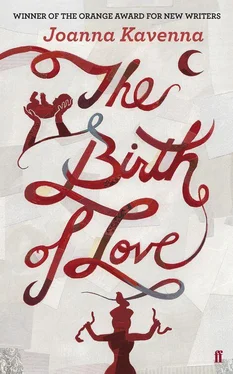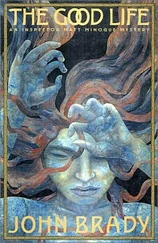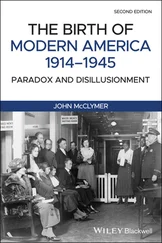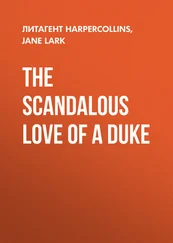It was improbable; her mother was coming to assess her. Now she took the phone back from Calumn again, tried him with the pen but he shook his head, knocked it out of her hand.
‘What about later, later today? It’s just, I have a friend coming this morning,’ said Brigid, as Calumn’s wails rose in pitch, and he lunged for the phone again.
‘Oh, I won’t stay long,’ said her mother.
*
Defeated, Brigid put the phone down and turned to her son. She smiled down at him, though he twisted in her arms, kicked against her. ‘Come on sweetie, come on,’ she said. She took his hand and danced him along, ‘Bouncy bouncy bouncy. Bouncy bouncy bouncy boy, look how we’re bouncing along.’ He began to chuckle. He lifted his head and looked delighted again. His energy amazed her, especially now she had slumped so consummately. It made her glad, that he was so enchanted by everything, so eager to know it, feel it, eat it — his appetites were robust and she admired that. She watched him, from far away — as if he was a beacon on a hill, and she was in the shadows, far below. He was radiant; he really burned with life — and she wondered if this unborn child — kicking now within her, pushing against the prison walls — would be as radiant as her son.
*
‘Shall we go and have some grub grub?’ she said to Calumn, kissing his ear, and he recognised the words and smiled back. ‘Dah,’ he said, nodding.
‘Let’s bounce into the kitchen,’ she said. Bouncy, bouncy, gub gub, they said — Calumn with his awkward little stomping movements, pausing from time to time to examine some fleck of dust. Gub gub, they said as they passed into the kitchen. The baby world of Calumn required her to communicate in monosyllables, to submit herself to these simplified versions of her own language. ‘Bek bek,’ she said to Calumn though her mother always told her — and would tell her again, no doubt, when she arrived later — that this would stunt his development. ‘I never baby-talked to you,’ her mother would say. ‘That must be why I was such a prodigy,’ Brigid would reply, laughing. Her whole being was tempered for Calumn, maintained at a level he could understand — though sometimes she felt he understood far more than she thought, was even in touch with something primal and significant. She didn’t really know why she thought that but sometimes when he became pensive or when he looked at her as if he could see her more clearly than anyone else, she wondered just what he knew, what he saw. In the kitchen she grabbed the protesting form of her son, bundled him quickly into his high chair and when he began to kick and flail his arms around she said, ‘Bek bek, gub gub,’ in a loud jovial voice, kissing him. When she gave him a book he flicked through the pages, smashed it on the table then dropped it on the floor. ‘Bek bek, gub gub,’ she and Calumn said to each other, as she put some fruit on a plate and directed it towards his scrabbling hands, and he began to paw at it and drop it and sometimes eat it. Now she had a few minutes, perhaps even ten minutes, while he sat there, playing with his food, so she put water in the kettle, found some chocolate in the fridge and ate it quickly, as her son chewed on a piece of apple. She made some tea, and now she heard the radio again. Brigid listened but only in a distracted way, making encouraging faces at her son and handing him chunks of apple. Occasionally she said, ‘Yum yum,’ pointing at her food, at his food, exaggerating the movements of her mouth so he would think it was fun to eat. And on the radio she heard people talking and didn’t entirely understand them, or she absorbed a few sentences then lost the thread while she said, ‘Yummy scrummy yum,’ to Calumn.
‘ … debut novel by Michael Stone …’ one of the radio voices was saying.
‘A sort of historical novel …’
‘Very loosely defined …’
*
Brigid put bread in the toaster, drank more tea, said, ‘Yes, sweetie, that’s right, that’s absolutely right. Would you like a piece of toast? Toast and honey, yes? You like a nice piece of toast and honey don’t you?’ she said, as she waited for the toast to pop up and on the radio another voice said, ‘… yes, a doctor …’
‘This man … Semmelweis …’
‘ … rise of modern obstetrics …’
‘Nee-nar gub gub,’ said Calumn.
‘Yum, yum, delicious. Mummy has some. Mmmm, delicious. Calumn has some … Mmmm delicious …’
‘Dah,’ said Calumn. ‘Dah.’
‘The imposition of technology on ancient process …’
‘Hardly fair … hospitals founded with benevolent intentions … Often the women were birthing illegitimate children … nowhere else to go …’
‘… but the midwives fared better …’
‘Well, they weren’t doing the autopsies …’
*
Brigid shook her head, spread honey on the toast, presented it to her son. His face was smeared with food and his hands were sticky, but he was babbling happily, enjoying the small rituals of the morning. She thought it was poignant, how much he enjoyed simply being with her, having her to himself. So she felt one more stab of guilt, even though she was having this child partly for Calumn, to give him a sibling, a life companion. She had a sentimental idea that one day he would thank her. But now, he didn’t understand and simply wanted her. He smiled at her, waving his fingers towards her, trying to grab her as she leaned over him. She kissed his hot face, smoothed his hair. ‘Lovely little boy. So beautiful.’ Then she sat down beside him at the table, holding her tea. She thought of Patrick in his office, typing emails, fielding calls from strangers. Leaning over his desk, a photograph of Calumn among the books and clutter. Living through time, elsewhere, apart from her. Perhaps he would be looking at the photograph of Calumn, in an idle moment he would glance towards it … and then the phone would ring.
*
‘… Budapest. Moved to Vienna as a young doctor. Failed in every other department, so had to go into obstetrics …’
‘Facts have been changed …’
‘Became obsessed with saving the lives of mothers …’
‘… like a plague …’
*
‘Ahhh ahhh ahhh …’ said Calumn, banging his spoon on the table.
‘Ssh, sweetie,’ said Brigid. She wondered if this was a message, if the radio was telling her something — if she must beware. She was superstitious and not reasonable at all. When the voices said, ‘A massacre of mothers …’ she trembled and didn’t want to listen any more. She was scaring herself, trying to hold back her fears, and sometimes saying ‘sweetie’ and sometimes ‘bek bek bek’. Still she couldn’t flick the switch, in case it was important, in case there was something she should understand. Then she wanted Patrick to be with her. She remembered now that he had an important lunch today. It was dreadful timing, he had said this morning, but they wouldn’t move it. This morning he had rushed out of the house, in his smartest suit, bearing a folder thick with papers. He carried this off towards the Tube, looking determined and as if his preoccupations mattered to the world, while she stood in the doorway, heavy and becalmed. Now Calumn put a finger to his lips, tried to ‘shush’ her back. She smiled back at him, even as she heard the warning from the radio –
‘… swathes of orphans …’
‘… called the hospital a charnel house …’
*
Calumn dropped his cup on the floor. That stopped him from eating, while he peered into the depths beneath him, searching for the cup. Instead of leaning down to pick it up, Brigid went to the cupboard and took out another, filled it with water. Swathes of orphans, she thought, and shook her head again. Then she missed what they were saying, as she splashed water at the dishes, stacked them on the draining board. It was clear that her brain had been rearranged by months of baby care and then the fatigue of pregnancy. Two rounds of pregnancy and all the sleepless nights with Calumn had made her kinder, more altruistic perhaps, and yet more easily unnerved. Often she took refuge on the surface: she considered the business of baby mush, she considered that carefully many times a day, and she pondered the complex question of whether her son needed more protein, or whether protein pained his stomach, and sometimes she thought, ‘Hey diddle diddle the cat and the fiddle the cow jumped over the moon …’ Despite all that, she sensed something else, she had not been aware of it before, some ancient force that kindled life within her. All her enterprises, her tangled hopes, were nothing, against this force. It made everything so very strange, and these phrases on the radio — these sanguine, clever voices — seemed to come from a world she had once inhabited, spoken in a language she had once mistaken for her own.
Читать дальше












